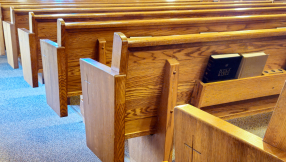It's been revealed that the British Christian blog collective Theads UK will close down its operations in the coming weeks. The site, run by the Evangelical Alliance, has for six years been a hub of diverse opinion on a range of topics, largely wrestling with theology, politics, and 21<sup>st century Christian culture, most often from the perspective of millennial believers exploring work, sex and lifestyle dilemmas.
In a post explaining the site's closure, Threads coordinator Stu Bothwell celebrated the 'conversation' that has taken place from a 'collective of Christians from all walks of life, who are living, working and trying to carve out our identity in our worlds'.
'As artists and bankers, singles and marrieds, visionaries and geeks, the hilarious and the deadly serious; we've been able to share our best thinking with brothers and sisters from across the UK.' Now, he said, the site will 'draw to a close', though the Evangelical Alliance 'remain as passionate as ever around resourcing those of us in our 20s and 30s'.

In the ever-evolving world of social media, it's not shocking for certain online initiatives to have their moment for a time before new sites or habits come along. Nothing lasts forever, and it's perhaps just cause for celebration that Threads existed and edified for as long as it did.
But does the move reflect a shift in Christian media? Rumours of the 'death of the blog' are common now, so is the same the case for Christian blogging?
Former Threads contributors last night were reflecting on Twitter about their own writing habits declining in frequency: work or family pressures meant some just no longer had time to blog. They might also be less sure of their opinions, feeling less able to speak into the latest national crisis with any clarity. If long-form blogging has declined, Twitter has expanded its reach as the home of wide-ranging and witty opinion on the latest zeitgeist: if you've a hot take to share, you just put it on there. The president of the United States certainly does.
We inhabit a link-saturated culture, where each click-through brings more adverts, tabs and other links to follow. If you want news, culture, opinion, you've hundreds of quality outlets to choose from, each producing more than you'll ever have the time to read. If it's specifically 'Christian' content you're after, you've still an abundance of opinions and voices to follow. Cumulatively then, it's a deeply competitive scenario in which not everyone can win.
That's then compounded by the fact that the way we receive content has changed: the newsfeeds of Twitter and Facebook no longer show you real-time updates but through opaque algorithms decide what content you'd like to see. If the algorithm hasn't favoured a certain link or figure, it might simply never be seen. If a blogger posts but no one reads it, does he still make a sound?
Threads also provided a hub for good disagreement, but is even the Christian world now too polarised for such a space to exist? The presence of online echo chambers, again largely thanks to those algorithms, is well-attested, and it's not absent in the Christian sub-culture. There's a Christian left and a Christian right, each increasingly antagonised by the other, at least at the extremes. In the US (and the UK to a degree) there's Desiring God or The Gospel Coalition for conservative evangelicals, and sites like Sojourners for more left-leaning progressives. Platforms that still try to cater to both might find they lack the bite that readers demand. The existence of contrasting opinion isn't a problem, but without a shared space of dialogue, it doesn't bode well for unity and mutual understanding.
The entrenchment can create a kind of community, heightening a sense of shared perspective, but it also tends to shut down conversation amid difference, something the church surely can't afford to do. Culture at large seems to be losing those shared spaces and experiences that unite across borders, since there are channels and perspectives ready-tailored to our specific inclinations. That's sad, and is even more so if the church, which is centred on a united perspective even alongside conflict, can't do any better.
That conflict can generate boredom too, and perhaps sheer fatigue is another factor shifting the present moment: with the abundance of opinion – increasingly hostile, posturing and click-baity – it doesn't always make for an attractive experience. Those who've had a taste of this may simply switch off – they may have done so already. If people are getting fresh air stepping back from living their lives online, that might be quite a healthy, liberating thing, worth celebrating, even if it means less attention for my latest hot take. Sometimes platforms of debate can generate connection and lift up the voiceless, but they can also just fuel the flames of human unkindness and unrest. Wisdom learns the difference.
There is a time for everything under the sun, as Ecclesiastes so famously declares. It does seem that Christian media is entering a new 'time', one that may require serious retooling and rethinking so that contemporary believers can converse in community about the things that matter. It's good to talk. Let's hope that the 21<sup>st century church (and not just millennials) can keep it up.
You can follow @JosephHartropp on Twitter













